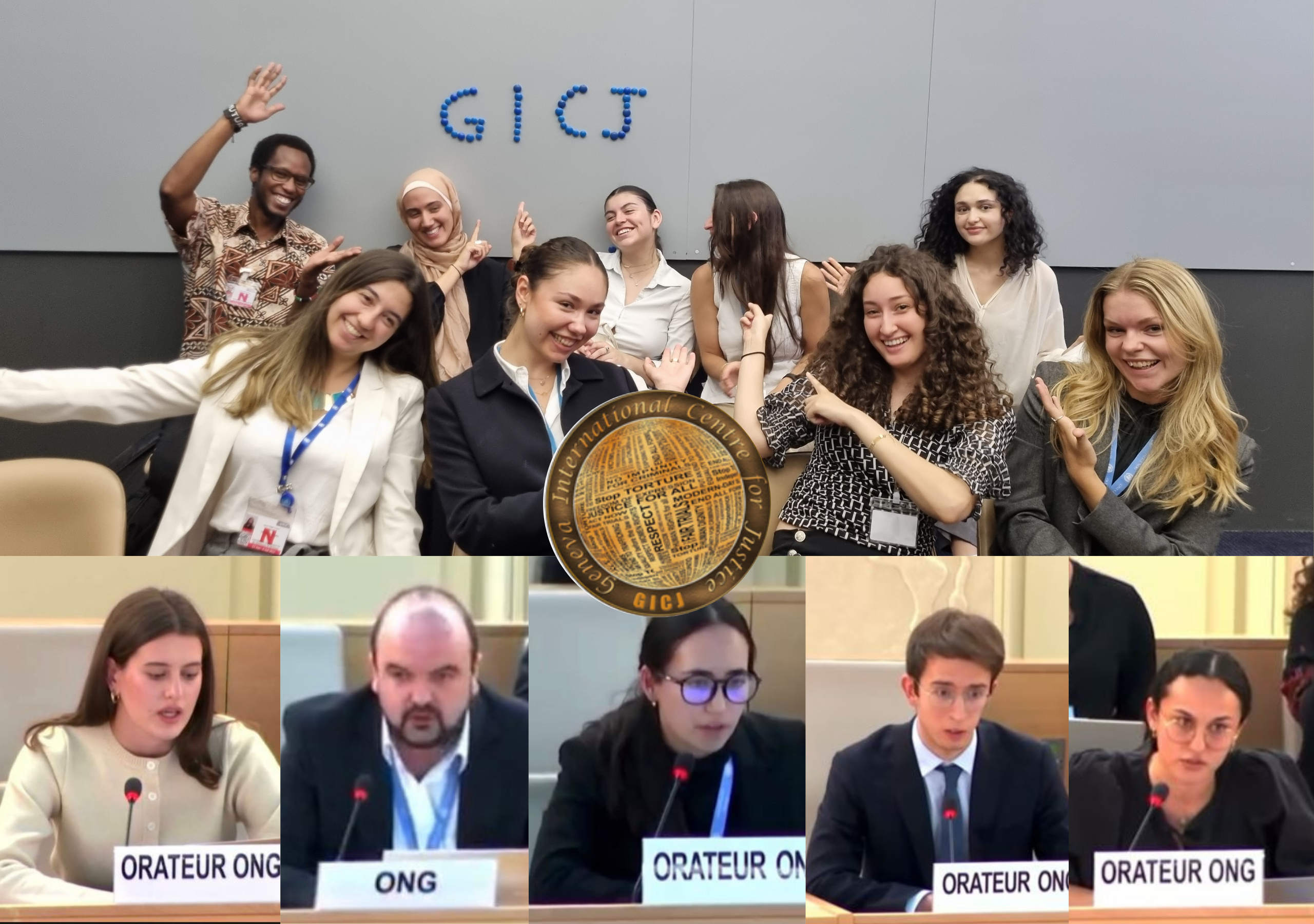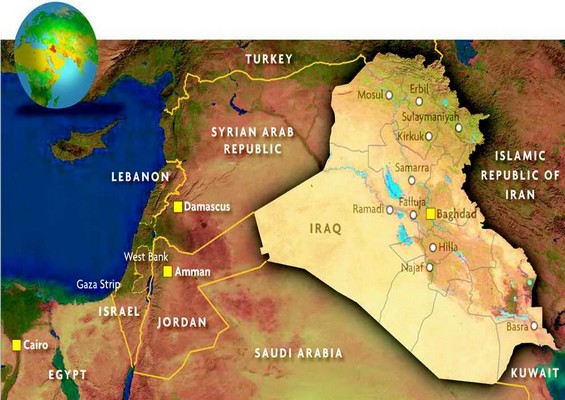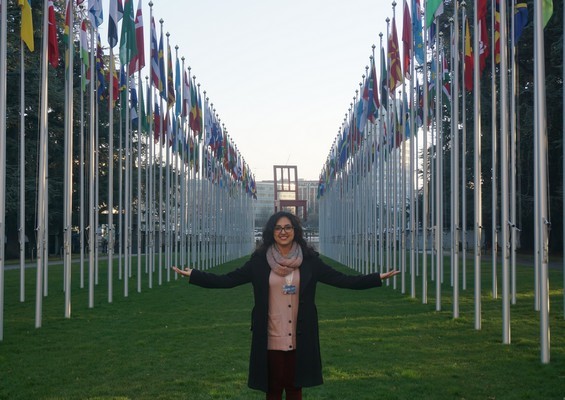About us
Geneva International Centre for Justice (GICJ) is a non-profit, non-governmental organization dedicated to the promotion and reinforcement of commitments to the principles and norms of human rights. GICJ is headquartered in Geneva, Switzerland and is governed by the Swiss Civil Code and its statutes.
Basing its work on the rules and principles of International Law, International Humanitarian Law and International Human Rights Law, GICJ observes and documents human rights violations and seeks justice for their victims through all legal means available.
Our mission
GICJ’s mission is to improve lives by tackling violations and all forms of violence and degrading or inhumane treatment through the strengthening of respect for human rights; reinforcing the independence of lawyers and judiciaries; consolidating the principles of equity and non-discrimination; ensuring rule of law is upheld; promoting a culture of awareness on human rights; and combating impunity.
Our objectives
The primary objectives of Geneva International Centre for Justice are to combat human rights violations, reinforce commitment to human rights principles, raise awareness of violations, hold violators accountable and seek justice for victims.
Within the scope of these overall objectives, GICJ also hopes to:
-
Strengthen respect for, and commitment to, human rights under all circumstances and at all times, leading to the implementation of rules and procedures aimed at putting an end to violations and combating impunity.
-
Consolidate the principles of equity and non-discrimination and in effort to contribute to the elimination of all forms of discrimination including race, religion, skin color and intellectual beliefs.
-
Work towards the strengthening of the rule of law and the independence of lawyers and judiciaries, thereby contributing to the guarantee of fair trials and due process.
-
Expose and document human rights violations and prepare all possible and necessary reports, studies, appeals, notifications, and data for the use and consideration of relevant and competent bodies and mechanism, particularly within the United Nations.
-
Contribute to societies and individuals’ awareness of human rights through the dissemination of a human rights culture.
-
Combat all forms of violence, degrading or inhumane treatment, and abuses of human dignity in prisons and detention centers.
Our work
GICJ relies on diverse methods and resources to raise awareness of human rights violations and achieve its mission. We work with a coalition of NGOs on the ground and around the world, which provide us with accurate, up to date information on violations. GICJ also works with networks of academics, lawyers and experts who contribute their knowledge and expertise on relevant issues and cases.
Headquartered in Geneva, the United Nations and corresponding human rights mechanisms are pivotal to our work. GICJ participates extensively with these mechanisms, in particular the Human Rights Council (HRC) and the Universal Periodic Review (UPR).
Our participation with the United Nations includes preparing and submitting reports on human rights violations for the HRC; delivering oral statements during sessions; organizing side events; informing and writing urgent appeals to relevant representatives and special rapporteurs on cases of human rights violations; and participating in meetings on human rights issues and civil society.
In addition to our work with the United Nations, GICJ also collaborates and coordinates with international organizations, NGOs, universities and research centres. We prepare reports and studies on particular situations and cases in the context of human rights and international law and use our partnerships and networks to ensure their wide distribution. Further, GICJ works with varying stakeholders in an attempt to find peaceful and fair resolutions to human rights- related conflicts.
In full agreement with the United Nations’ acknowledgment of the “fundamental importance of human rights education and training in contributing to the promotion, protection and effective realization of all human rights”, GICJ works to educate on human rights law and human rights violations. To this end, GICJ organizes forums and workshops on these subjects and disseminates all resulting work and information. Recognizing the importance of, and the impact that well-trained and knowledgeable individuals can have on the advancement of human rights and in educating others on the subject, GICJ develops and organizes human rights trainings and courses.
Cooperation with non-governmental organizations and human rights activists
Geneva International Centre for Justice (GICJ) follows up on the work and activities of human rights mechanisms, in particular the Human Rights Council and associated special rapporteurs and working groups. GICJ has the necessary expertise to qualify non-governmental organizations (NGOs) for effective participation in this field of work.
In this context, GICJ offers various options for the desired outcomes of cooperation agreements with NGOs, including:
• Receiving GICJ periodic bulletins which consisting its follow-up on the Work of Human Rights Bodies and the Office of the High Commissioner.
• Involving NGOs and human rights activists in meetings of the Human Rights Council, committee meetings, side events and conferences.
• Assisting NGOs in preparing written statements to be submitted at the Human Rights Council sessions.
• Assisting NGOs and human rights activists in delivering oral statements at the Human Rights Council sessions.
• Assisting NGOs in holding meetings and workshops during the Human Rights Council sessions to present cases or issues related to UN activities, country or regional situations, human rights violations, along with development, environment and public health issues.
Cooperation with universities, scientific research institutions and research centres
Geneva International Centre for Justice provides opportunities for universities and research centres to cooperate at various levels including:
• Training university students, inclusive of masters and doctoral students, on the work of the United Nations, its international legal bodies and its human rights mechanisms.
• Assisting students of higher studies in the fields of international law, international human rights law and international humanitarian law, as well as topics on middle east and north Africa, so as to complete the requirements of their theoretical or applied research in Geneva by providing opportunities to perform research in these areas along with practical prospects and training.
• Organizing joint conferences and seminars on different topics of mutual interest.
• Presenting the work of research centres at the United Nations, and highlighting them through reports, statements or side events within the United Nations or academic institutions.
For more details please visit intern and volunteer opportunities here.
Training courses
Training courses are an important part of GICJ’s work. The aim of the training courses is to enable activists and emerging NGOs to have the basic capacities to actively contribute to human rights activism and action.
Accordingly, trainees have access to and interact with various human rights mechanisms of the United Nations and participate in meetings and symposia held within the framework of the Human Rights Council in Geneva or other United Nations bodies or beyond. The courses also help train participants on how to contribute remotely to activities and meetings via the preparation of working papers, reports, letters and statements.
At the end of training session, trainees will receive a GICJ certificate expressing the extensive knowledge gained by the trainee in the fields of human rights and the United Nations framework.
For more details please visit human rights training courses here.











